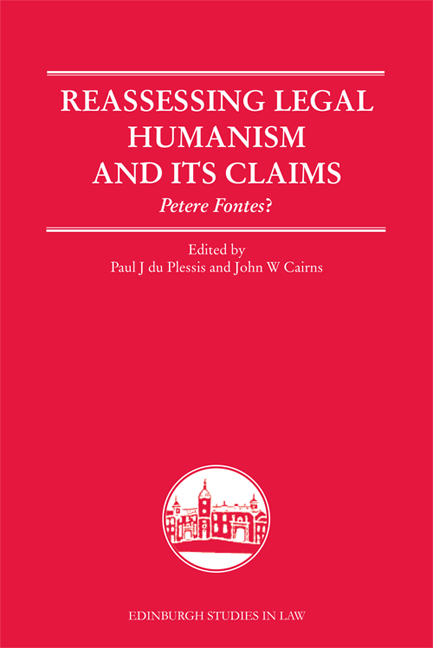Book contents
- Frontmatter
- Contents
- Preface
- A Note on Names and Book Titles
- List of Contributors
- List of Abbreviations
- Introduction
- Part I DEFINING LEGAL HUMANISM
- Part II A BREAK WITH THE PAST/CONTEMPORARY CRITIQUES
- 3 Deconstructing Iurisdictio: The Adventures of a Legal Category in the Hands of the Humanist Jurists
- 4 Reassessing the Influence of Medieval Jurisprudence on Jacques Cujas’ (1522–1590) Method
- 5 Redefining Ius to Restore Justice: The Centrality of Ius Gentium in Humanist Jurisprudence
- Part III LEGAL HUMANISM: A PAN-EUROPEAN METHODOLOGY?
- Part IV LEGAL HUMANISM AND THE BOOK TRADE
- Postscript
- Index
4 - Reassessing the Influence of Medieval Jurisprudence on Jacques Cujas’ (1522–1590) Method
from Part II - A BREAK WITH THE PAST/CONTEMPORARY CRITIQUES
Published online by Cambridge University Press: 05 September 2016
- Frontmatter
- Contents
- Preface
- A Note on Names and Book Titles
- List of Contributors
- List of Abbreviations
- Introduction
- Part I DEFINING LEGAL HUMANISM
- Part II A BREAK WITH THE PAST/CONTEMPORARY CRITIQUES
- 3 Deconstructing Iurisdictio: The Adventures of a Legal Category in the Hands of the Humanist Jurists
- 4 Reassessing the Influence of Medieval Jurisprudence on Jacques Cujas’ (1522–1590) Method
- 5 Redefining Ius to Restore Justice: The Centrality of Ius Gentium in Humanist Jurisprudence
- Part III LEGAL HUMANISM: A PAN-EUROPEAN METHODOLOGY?
- Part IV LEGAL HUMANISM AND THE BOOK TRADE
- Postscript
- Index
Summary
A. INTRODUCTION
B. THE GENERAL INFLUENCE OF THE GLOSSATORS
(1)A continual resort
(2)A methodological change
C. THE MIXED INFLUENCE OF THE COMMENTATORS
(1)An uneven use
(2)A nuanced criticism
D. CONCLUSIONS
INTRODUCTION
The fame of Jacques Cujas might make one think that his method is well known. But most research about the French humanist jurisconsult is dated and incomplete. Moreover, they often repeat the same stereotyped presentation of Cujas’ method, which tends to implement all the principles of historicist humanism without subtlety. Thus, according to the traditional portrayal, Cujas despised medieval jurisprudence, was not interested in legal practice and only pursued the correction of interpolations. Obviously, there are more nuanced descriptions of his works, but none of them rests on a complete reading of the Opera omnia. This is why the method of Jacques Cujas needs to be reassessed.
Jacques Cujas was born at Toulouse (in the south of France) in 1522, where he completed his studies. In 1544, after the departure of his master Arnaud Du Ferrier (1506–1585), he left the university to deepen his knowledge in classics. He did not, however, neglect law, and he became lecturer in charge of Justinian's Institutes at the University of Toulouse in 1547. By that time, he had already made the humanist ideas his own, and this had earned him his first praise.
When he did not manage to get a chair of Roman law in Toulouse, he left for Cahors, where he succeeded Antonio de Goveia (1505–1566) as professor in 1554. Less than a year later, Margaret of France (1523–1574), Duchess of Berry, offered Cujas a chair in the renowned University of Bourges, which was then the centre of the reform of legal studies. Cujas had to deal with the opposition of a part of the university. The protesters, led by François Le Douaren (1509–1559), wanted Hugues Doneau (1527–1591) to have the chair. In this context, Cujas resigned himself to leave in 1557. However, after less than two years in the University of Valence, he came back to Bourges in November 1559.
- Type
- Chapter
- Information
- Reassessing Legal Humanism and its ClaimsPetere Fontes?, pp. 88 - 107Publisher: Edinburgh University PressPrint publication year: 2015



